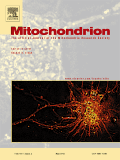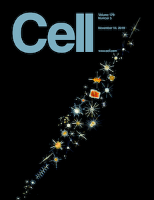
MITOCHONDRION
metrics 2024
Pioneering Discoveries in Mitochondrial Function
Introduction
MITOCHONDRION is a distinguished peer-reviewed journal published by Elsevier Science Ltd, focusing on the intricate roles of mitochondria in various biological processes. With an ISSN of 1567-7249 and an E-ISSN of 1872-8278, this journal has carved out a significant niche within the fields of Cell Biology, Molecular Biology, and Molecular Medicine, as evidenced by its Q2 ranking in these categories for 2023. The journal emphasizes the latest research on mitochondrial biogenesis, function, and dynamics, making it a pivotal resource for professionals, researchers, and students engaged in cutting-edge mitochondrial studies. With a robust Scopus ranking, placing it in the top percentiles of its categories, MITOCHONDRION not only advances scientific understanding but also fosters collaboration and innovation within the research community. Though it does not offer Open Access, the journal's comprehensive articles and reviews remain indispensable for those striving to unravel the mysteries of mitochondrial biology. For research spanning from its inception in 2001 through its ongoing commitment to 2024, MITOCHONDRION continues to be a vital platform for disseminating high-quality, impactful research in the realm of mitochondrial science.
Metrics 2024
 1.21
1.21 3.90
3.90 4.20
4.20 109
109Metrics History
Rank 2024
Scopus
IF (Web Of Science)
JCI (Web Of Science)
Quartile History
Similar Journals

CELL
Pioneering research in biochemistry and genetics.CELL is a premier academic journal in the field of Biochemistry, Genetics, and Molecular Biology, published by CELL PRESS. Founded in 1974, this esteemed journal has steadfastly contributed to advancing our understanding of cellular processes and organisms, making it integral for researchers and practitioners alike. With an impressive impact factor that places it in the Q1 category of its field, CELL ranks #1 out of 221 in general biochemistry and genetics, achieving a remarkable 99th percentile in Scopus rankings. Though it is not currently an open-access publication, the journal regularly disseminates high-quality research that impacts the scientific community significantly. Researchers, students, and professionals seeking to stay at the forefront of innovative discoveries and methodologies in molecular biology will find CELL an invaluable resource through its comprehensive articles and reviews.

Mitochondrial DNA Part B-Resources
Exploring the Frontiers of Molecular BiologyMitochondrial DNA Part B-Resources, published by TAYLOR & FRANCIS LTD, is a prominent academic journal focusing on the vast and evolving field of genetics and molecular biology. As an open access resource, it is dedicated to providing valuable insights and comprehensive data on mitochondrial DNA, an area crucial for understanding cellular functions, genetic inheritance, and various diseases. Although relatively new, having commenced in 2016, the journal has gained recognition with its current Scopus rankings placing it in the lower quartiles for both Genetics and Molecular Biology. It serves as an essential platform for researchers, professionals, and students at the intersection of genetics and biotechnology, fostering collaboration and innovation. With a commitment to quality research and accessibility, Mitochondrial DNA Part B-Resources is poised to contribute significantly to the scientific community until at least 2024 and beyond.

Mitochondrial DNA Part A
Exploring the Genetic Blueprint of LifeMitochondrial DNA Part A, published by Taylor & Francis Ltd, is a distinguished journal dedicated to the exploration of mitochondrial genetics and its implications for health and disease. With an ISSN of 2470-1394 and an E-ISSN of 2470-1408, this journal serves as an open-access platform, promoting the dissemination of high-quality research in the field. Operating from the United Kingdom, it offers a vital resource for researchers and professionals keen to delve into the rapidly evolving landscape of mitochondrial studies. Although currently ranked Q4 in both the Genetics and Molecular Biology categories, the journal continues to be a valuable outlet for emerging findings that could impact our understanding of cellular processes and hereditary conditions. Researchers can access articles and data covering recent advancements from 2016 through 2022, with ongoing contributions expected in 2024. As the field grows, so too does the importance of this journal as a source of knowledge and collaboration for the academic community.

BIOCHIMICA ET BIOPHYSICA ACTA-BIOENERGETICS
Innovative Research at the Intersection of Life SciencesBIOCHIMICA ET BIOPHYSICA ACTA-BIOENERGETICS is a prestigious journal published by Elsevier, dedicated to advancing the fields of biochemistry, biophysics, and cell biology. Established in 1967, this journal is committed to disseminating high-quality research that unveils the molecular mechanisms of bioenergetics, encompassing a wide range of topics from mitochondrial function to energy metabolism. With an exceptional impact factor and a current ranking in the Q1 quartile across multiple categories—specifically ranked #13 in Biophysics and featuring strong positions in Biochemistry and Cell Biology—this journal is recognized for its influential contributions to the scientific community. Scholars, researchers, and students globally benefit from its rigorous peer-review process and access options, although it is not currently open access. By providing a platform for innovative research, BIOCHIMICA ET BIOPHYSICA ACTA-BIOENERGETICS plays a critical role in fostering scientific advancement and collaboration among professionals in the field.

FREE RADICAL BIOLOGY AND MEDICINE
Exploring the Dynamics of Free Radicals in Health and DiseaseFREE RADICAL BIOLOGY AND MEDICINE, published by Elsevier Science Inc, is a premier journal dedicated to the field of biochemistry and medical physiology. With an ISSN of 0891-5849 and an E-ISSN of 1873-4596, this journal stands out with its impressive ranking in the 2023 category quartiles: Q1 in Biochemistry and Q1 in Physiology (medical). Specifically, it has achieved a remarkable position of 29th out of 438 in Biochemistry and 8th out of 113 in Physiology, placing it firmly in the 93rd percentile of its field, as per Scopus rankings. Since its inception in 1987, the journal has focused on advancing the understanding of free radicals and their role in biological processes, encompassing a wide range of topics from oxidative stress to therapeutic applications. Although it does not currently offer open access, the journal's rigorous peer-review process and impactful research ensure that it remains a valuable resource for researchers and professionals seeking to explore the intricate relationships between free radicals and health. The journal's headquarters are located at STE 800, 230 Park Ave, New York, NY 10169, reflecting its esteemed place within the scientific community and commitment to high-quality research.

RUSSIAN JOURNAL OF GENETICS
Exploring the Frontiers of Genetic ResearchRUSSIAN JOURNAL OF GENETICS is a significant platform in the field of genetics, published by PLEIADES PUBLISHING INC since its inception in 1996. With an ISSN of 1022-7954 and an E-ISSN of 1608-3369, the journal focuses on a wide array of topics within genetics, providing researchers, professionals, and students with insights into advancements and discoveries in this ever-evolving discipline. While it currently holds a Q4 ranking in the 2023 Genetics category according to Scopus, representing invaluable opportunities for knowledge dissemination, the journal is actively working to enhance its impact in future rankings. Readers will find the journal a repository of diverse genetic research findings, methodologies, and theoretical advancements. Although it is not an open-access journal, it is committed to serving the academic community through rigorous peer-reviewed articles. With a consistent publication trajectory spanning to 2024, the RUSSIAN JOURNAL OF GENETICS remains a crucial resource for those aspiring to stay at the forefront of genetic research and applications.

JOURNAL OF BIOENERGETICS AND BIOMEMBRANES
Advancing Understanding in Bioenergetics and Membrane ScienceJOURNAL OF BIOENERGETICS AND BIOMEMBRANES, published by SPRINGER/PLENUM PUBLISHERS, is a leading journal dedicated to the study of bioenergetics and biomembranes, covering essential topics such as cellular energy transformation and membrane dynamics. Since its inception in 1976, the journal has developed a robust reputation within the scientific community, currently holding a Q3 ranking in Cell Biology and a Q2 ranking in Physiology for 2023. Boasting a prestigious Scopus Rank in both Biochemistry and Physiology, it serves as a crucial platform for disseminating pioneering research findings. With its commitment to quality and innovation, the journal plays a significant role in advancing our understanding of the fundamental processes that underlie life at the cellular level. Although it does not offer open access options, the journal remains accessible through universities and research institutions, ensuring that vital research is widely shared among scholars, professionals, and students alike. The JOURNAL OF BIOENERGETICS AND BIOMEMBRANES is essential for anyone seeking to contribute to or stay informed about developments in this dynamic field.

Nature Metabolism
Transforming metabolic research into impactful discoveries.Nature Metabolism, published by NATURE PORTFOLIO, is a leading journal dedicated to advancing the field of metabolic research and its implications across various biological systems. Since its inception in 2019, this esteemed journal has rapidly established itself as a vital resource for researchers, professionals, and students alike, reflecting its prominence through a prestigious Q1 ranking in several key categories including Cell Biology, Endocrinology, Diabetes and Metabolism, Internal Medicine, and Physiology. With an impressive Scopus ranking, underscoring its impact in Medicine and Biochemistry disciplines, Nature Metabolism offers an exceptional platform for disseminating high-quality research that explores the intricate mechanisms of metabolism and its association with health and disease. Although currently not open access, it continues to gain visibility and appreciation within the scientific community, ensuring that groundbreaking findings reach interested audiences globally from its hub in Berlin, Germany. Whether you are an experienced researcher or an aspiring student, Nature Metabolism serves as an invaluable asset in navigating the complexities of metabolic science.

ANTIOXIDANTS & REDOX SIGNALING
Advancing the Frontiers of Redox BiologyANTIOXIDANTS & REDOX SIGNALING, published by MARY ANN LIEBERT, INC, is a premier journal dedicated to advancing the understanding of oxidative stress, antioxidants, and redox biology in various health contexts. With an impressive track record since its inception in 1999, this journal has continually evolved, currently converging towards 2024 as a core resource for researchers in biochemistry, cell biology, and molecular medicine. It holds a distinguished position in Q1 across several categories, including Biochemistry, Cell Biology, and Clinical Biochemistry, reflecting its critical role in disseminating high-quality research that impacts the fields of physiology and medicine. Despite not being an open-access journal, ANTIOXIDANTS & REDOX SIGNALING is renowned for its rigorous peer-review process and wide reach, ensuring that published articles are both influential and accessible to professionals, academia, and students alike. Researchers can benefit from its comprehensive articles that delve into cutting-edge discoveries and emerging therapies related to oxidative stress and its biological implications.

npj Aging
Fostering interdisciplinary dialogue on aging.npj Aging, published by Nature Publishing Group, is a pioneering journal dedicated to advancing our understanding of the biological, clinical, and social aspects of aging. With an E-ISSN of 2731-6068, this open-access journal aims to foster innovative research and interdisciplinary dialogue among scientists, clinicians, and policy-makers. As of its inception in 2023, the journal has quickly established itself within the scholarly community, ranking 15th in Medicine (Geriatrics and Gerontology) and 12th in Biochemistry, Genetics, and Molecular Biology focusing on Aging, reflecting a strong percentile standing in both categories. The journal provides a platform for disseminating important findings that address the complexities of aging, ensuring accessibility for a broader audience. Located at the Macmillan Building, 4 Crinan St, London, England, npj Aging aspires to be an essential resource for those seeking to enhance their understanding and contribute to the field of gerontology.